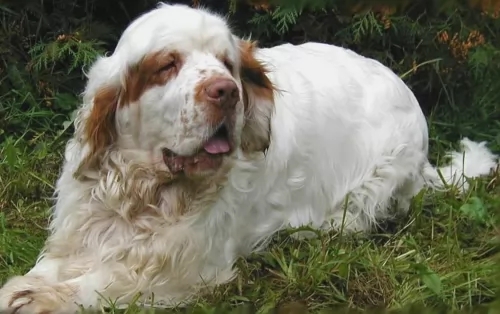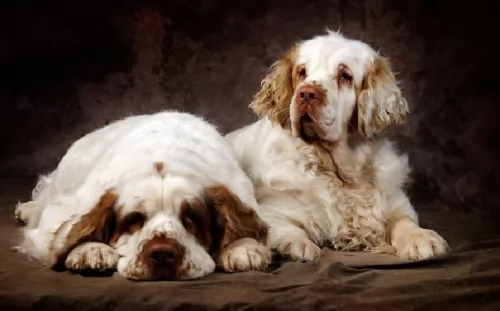 Petzlover
Petzlover Both Clumber Spaniel and Scottish Terrier are originated from United Kingdom. Clumber Spaniel may grow 25 cm / 10 inches higher than Scottish Terrier. Clumber Spaniel may weigh 29 kg / 64 pounds more than Scottish Terrier. Both Clumber Spaniel and Scottish Terrier has almost same life span. Both Clumber Spaniel and Scottish Terrier has same litter size. Clumber Spaniel requires High Maintenance. But Scottish Terrier requires Moderate Maintenance
Both Clumber Spaniel and Scottish Terrier are originated from United Kingdom. Clumber Spaniel may grow 25 cm / 10 inches higher than Scottish Terrier. Clumber Spaniel may weigh 29 kg / 64 pounds more than Scottish Terrier. Both Clumber Spaniel and Scottish Terrier has almost same life span. Both Clumber Spaniel and Scottish Terrier has same litter size. Clumber Spaniel requires High Maintenance. But Scottish Terrier requires Moderate Maintenance
 Ever since winning in Confirmation at Westminster Kennel Club’s annual show, the popularity of the Clumber Spaniel has increased markedly. The breed of Clumber Spaniel comes from the United Kingdom and it is the largest of all the spaniels. The breed is named for the Clumber Park where it was developed in Nottinghamshire. The Clumber Spaniel a=was designed to be a gundog or hunter in heavy weeds or cover. They have been popular with the Royal Family and were kept by King George V, King Edward VII, and Prince Albert.
Ever since winning in Confirmation at Westminster Kennel Club’s annual show, the popularity of the Clumber Spaniel has increased markedly. The breed of Clumber Spaniel comes from the United Kingdom and it is the largest of all the spaniels. The breed is named for the Clumber Park where it was developed in Nottinghamshire. The Clumber Spaniel a=was designed to be a gundog or hunter in heavy weeds or cover. They have been popular with the Royal Family and were kept by King George V, King Edward VII, and Prince Albert.
It is possible that during the French Revolution, the Duc de Noailles gave his spaniels to the Duke of Newcastle in Nottinghamshire, These spaniels, Alpine Spaniel, are extinct. At the time they were bred with Basset Hounds and Great Pyrenees.
Another line of thought has the Clumber Spaniel descending form an ancient Bleinheim Spaniel, which was used to later develop the King Charles Spaniel.
Whichever theory is true, we know that they were first bred and improved by William Mansell. They were shown in 1859 in England. They were bred almost exclusively by nobility until the mid-19th century. Then World War 1 caused all breeding to be discontinued and the number of Clumbers declined drastically, only to be redeveloped after the was by King George V.
The Cumber won Best in Show at the prestige’s Crufts 1991 Centenary Show. When the American Kennel Club recognized the Clumber Spaniel, there were only 9 other breeds officially recognized. They came to Canada in the same year of 1884. They are also recognized by the UK Kennel Club as a Vulnerable Native Breed. A Clumber bred by Doug Johnson won Best in Show at the 1996 Westminster Dog Show.
The Clumber Spaniel is a loyal, gentle soul who is not very friendly with strangers. They shed all the time and snore loudly.
 The Scottish Terrier is also known as the Aberdeen Terrier but people who love and know him refer to him fondly as the Scottie.
The Scottish Terrier is also known as the Aberdeen Terrier but people who love and know him refer to him fondly as the Scottie.
These little dogs were originally bred to hunt vermin on farms and their actual origin is ancient. It is believed that the first descriptions of these dogs date way back to 1436 with there being 2 varieties - a rough-haired Scotch Terrier and a smooth-haired English Terrier.
In 1881 the Scottish Terrier Club of England was founded with the Scottish Terrier Club of Scotland being founded in 1888. Scotties were introduced to America in the early 1890s.
 The Clumber Spaniel is heavy-boned, with a very large head and a square muzzle. Of all spaniels, he is the biggest. His expressive face wears a dopey, sad look and his eyes are large, shaped like leaves. The muzzle is as large as the head and his nose is square. He has freckles on his muzzle and a deep chest. His legs are straight, and his feet are solid.
The Clumber Spaniel is heavy-boned, with a very large head and a square muzzle. Of all spaniels, he is the biggest. His expressive face wears a dopey, sad look and his eyes are large, shaped like leaves. The muzzle is as large as the head and his nose is square. He has freckles on his muzzle and a deep chest. His legs are straight, and his feet are solid.
The Clumber Spaniel gives off a dignified air and despite his expressions, he is ready to play or to work at any time.
 The Scottish Terrier is a small dog, fairly robustly built but with short legs. He has a wiry, weather-resistant coat and a soft undercoat. The coat is essentially black but there are other colors too such as a wheaten shade, grey-black and brindle too.
The Scottish Terrier is a small dog, fairly robustly built but with short legs. He has a wiry, weather-resistant coat and a soft undercoat. The coat is essentially black but there are other colors too such as a wheaten shade, grey-black and brindle too.
The ears are erect, the eyes small and bright. The tail isn’t docked but is of medium length and is nearly always held up, without curling over the back.
Height at withers for both males and females should be roughly 23 to 26cm and weight in the region of 8 – 10 kg.
The Scottie is a an independent, robust breed. He is playful as a puppy, but as he matures he becomes more dignified and dour. He is stubborn, but being a terrier he is alert and makes a good watchdog. For a small dog he has a powerful bark.
Brave, loving and loyal, he can fit into life in the city or the countryside so long has he has his human family close by. He doesn’t take kindly to strangers and he he slightly aggressive with other dogs he doesn’t know. He makes a great playmate for children but he certainly doesn’t like being prodded, sat on and poked by small children.
 The Scottie is strong willed and independent, and training and socialization is important if you don’t want your Scottie believing he has the final say.
The Scottie is strong willed and independent, and training and socialization is important if you don’t want your Scottie believing he has the final say.
These dogs are stubborn and dominant and will need a strong, firm but kind owner. They’re aggressive with other dogs, but get on well with their human family.
When you bring one of these distinctive looking dogs into your home, he’ll be a loving, loyal friend.
 The Clumber Spaniel can suffer from a variety of conditions due to its very design and genetics. Lameness early in life can be attributed to the large and fast-growing bones in the Clumber. This lameness will dissipate when the pup is fully grown. Other issues include:
The Clumber Spaniel can suffer from a variety of conditions due to its very design and genetics. Lameness early in life can be attributed to the large and fast-growing bones in the Clumber. This lameness will dissipate when the pup is fully grown. Other issues include:
Can become dehydrated and all the problems that arise from a dog being overheated and dehydrated.
Must have a caesarian section. They may also have a sensitivity to the anesthesia used in the procedure.
Hypothyroidism with ear and skin complications.
They cannot take sulfa drugs.
 Your Scottie is looked upon as being a generally healthy dog breed, but as with any other healthy dogs, he can succumb to some of the conditions and diseases that dogs get -
Your Scottie is looked upon as being a generally healthy dog breed, but as with any other healthy dogs, he can succumb to some of the conditions and diseases that dogs get -
This is an inherited blood disorder where the blood doesn’t clot properly. The dog will bleed excessively after an injury. Fortunately, while there isn’t a cure, dogs can lead normal lives.
Scottish Terriers are more prone to developing cancer than other dogs. Bladder cancer, lymphosarcoma and malignant melanoma are just some of the cancers they can get. Some cancers are treatable and there is a good success rate in dogs receiving chemotherapy.
When you brush your Scottie, look out for new, unusual lumps that could be indicative of cancer.
Scotty Cramp isn’t serious but uncomfortable for your pet. When your dog becomes worked up, you’ll see him arching his spine and he walks around for a few minutes with a stiff unnatural gait.
Obesity is regarded as a serious disease as it puts strain on the dogs joints and also creates back pain and digestive disorders.
 The Clumber has a tendency to gain weight and become obese. Feed them wisely. Feed about ¼ to ½ of a cup of high quality dry dog food twice a day.
The Clumber has a tendency to gain weight and become obese. Feed them wisely. Feed about ¼ to ½ of a cup of high quality dry dog food twice a day.
This can be cervical or spinal. The discs can be bulging or ruptured. Can lead to paralysis if not treated properly.
Entropion with inward rolling of eyelid or Ectropion with outward rolling of eyelid.
The Clumber Spaniel is not the most energetic of canines. He still needs moderate exercise daily but don’t overdo it. Walks, fetch, swimming, chase or confirmation are good activities for a Clumber.
 Scotties were once bred as working dogs, and they will certainly require daily exercise and stimulation. He will love a walk but you can’t expect him to run with you as he has short legs.
Scotties were once bred as working dogs, and they will certainly require daily exercise and stimulation. He will love a walk but you can’t expect him to run with you as he has short legs.
The Scottie sheds, so he will need to be brushed at least twice weekly. He will require quite a bit of grooming in terms of having the coat professionally trimmed and clipped.
His eyes and ears will need to be checked as well as his teeth. He can’t tell you if he has terrible toothache and while brushing him, check the teeth. Trim his nails too.
It is always recommended that you feed dogs according to size, age and activity levels. Dogs are individuals and they don’t all need the same food.
The quality of the dog food you provide makes a huge difference on your dog’s health. It always pays to go with the better quality kibble available to dogs. Your Scottish Terrier will be depending on your for quality kibble with the right blend of vitamins and minerals.
Dogs thrive on simplicity and consistency and you want to provide him with some home-made food too that gels well with his digestive system. A little bit of raw meat occasionally can also do him the world of good.
Make sure he always has cool, fresh water to drink.